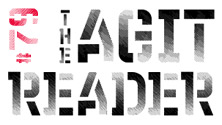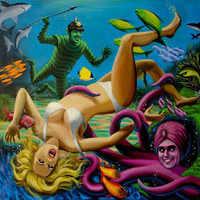
Invisible Girl
In the Red
Eyeing all the nymphettes shaking what eternity gave them down front at the King Khan & BBQ Show shows never ceases to make me wonder... well, about a lot of things, but primarily why there aren’t more trash-rock bands that use a 1956 Coke and maraschino cherry–stuccoed malt shop as their base of operations. Anyway, they ain’t, and so we wait patiently for these bi-continental batties to get together and record another batch of gems every few years (whilst snacking on the Black Lips’ smattering of greaser anthems in between). And despite the numerous side projects, endless touring, and zany interweb vids, the King Khan & BBQ Show have picked right back up where they doo-woped off with 2006’s What’s for Dinner.
BBQ’s vocals are still heated with a teary Sam Cooke-r, plasteredly pining for the affections of those shaking nymphettes, yet keeping them at arm’s length via the nervous, early Velvet Underground guitar clanging that skitters underneath even the most swooning crooners (“Third Ave,” “I’ll Be Loving You”). That arm’s got itchy fingers, though, as evidenced by naming the album after one of the most heaving heart-pop songs they’ve concocted (“Invisible Girl”) and leaving sure stompers like “Truth or Dare” and “Lonely Boy” to come a-kicking later in the record. Then again, “Tastebuds” butts right up next to “Invisible Girl,” with talk of “tastebuds on my cock, your cunt, my nuts.” And “Animal Party” revives the lost art of the danceable novelty tune not written by Southern rappers.
Whichever way they sway their half-naked hips and turbaned heads, the King Khan & BBQ Show have become (maybe) the most reliable act in an indie universe whose pathological need for constant, pointless reinvention has sucked everything into its sucky vortex—even the trash-rock mileau from which this duo sprung.
Eric Davidson
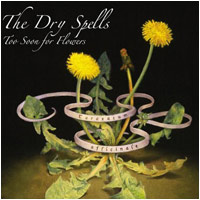
Too Soon For Flowers
Antenna Farm/Empty Cellar
In a rare instance of thoughtful nomenclature, the Dry Spells have chosen a name that’s the perfect dichotomy of the sound captured on their debut, Too Soon for Flowers. The band’s folksome blend is arid and earthen, barren of any artifice, while at the same time conjuring fanciful apparitions buoyed by their radiant voices. In that sense, while rather mellow on the surface, there is also something eerie and disquieting here too. This dark underbelly is more obvious in songs like “Batwood,” which details a suicide attempt undone by a fish, but can also be heard in the Southern Gothic overtones found on “Sruti” and elsewhere. A close comparison might be All About Eve, but there’s more Dixie than Britannia in the Dry Spells’ Flowers, though the difference is more slight in their version of “Black Is the Color.”
And though the album edges at times towards Lilith fare, such tendencies are kept in check through creative flourishes like the brimming groove of “The Golden Vanity” and the syncopated rhythms of “Lost Daughter.” The band, which features members of Citay, has managed to find a bit of magic in something seemingly anachronistic: an organic melding of voices and unaffected instrumentation.
Stephen Slaybaugh
MP3: “Batwood”
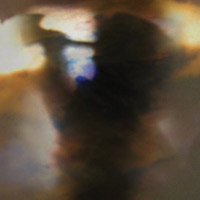
Fall Be Kind ep
Domino
Along the prolific spectrum of Animal Collective weirdness, Fall Be Kind lands just a few clicks away from the “just okay” side. Unfortunately, following a best album of 2009 can be a struggle, so this EP’s work is not to be envied. Topping songs like “My Girls” or “Summertime Clothes” will never be easy. As if anticipating this attitude from fans (and critics), Panda Bear asks, “Will I get to move on soon?” on the contender for the latest best Animal Collective song, the closing “I Think I Can.”
The band has a formula that works: cavernous drums cutting through swooshy, watery sounding synthesized sounds; samples and sound collage from here or there; vocal harmonies swirling around the whole cacophonous mess; and repetition, repetition, repetition, repetition, until the individual parts piece themselves together as a unified whole. It’s almost academic and calculated, yet it escapes sounding soulless and stale—for the most part. “What Would I Want? Sky,” utilizing a Grateful Dead sample no less, registers on the stale end of the spectrum. The beat is flat and clashes with the sample, and the vocals are too up front, too clean and missing that heady layered harmonizing that makes so much of AC’s work fresh and exciting. Maybe they decided it was time to clean it up and ready a single for the disenfranchised Deadheads? “Graze” and “Bleed” make up for this misstep with enough sparkling melodies and hypnotizing drone to warrant a 12-inch single.
I’m sure Animal Collective doesn’t intentionally head to the studio to best their previous successes; the sound of most of these songs is genuine. But I can almost hear the cargo-panted kids at the record store telling their friends that it’s not as good as the last one when deciding to buy Fall Be Kind or not. Don’t listen to them, kids. Sorta weird for Animal Collective is still weirder than anything else you’ll find lately.
Michael P. O’Shaughnessy
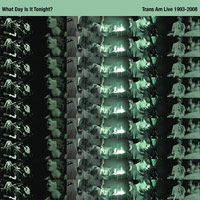
What Day Is It Tonight? Live 1996–2008
Thrill Jockey
Back in the mid-90s, after alternative music had been solidified into a viable commercial pursuit, fans began looking for the “next” thing. Out of that perceived void, Trans Am appeared. The DC trio, comprised of Nathan Means (bass, vocals and keyboards), Philip Manley (guitar, keyboard and vocals) and Sebastian Thomson (drums), was an alternative to the alternative, delivering whipsmart instrumental rock without a prog aftertaste. As a result, they were arguably one of the first bands in the always embarrassingly named “post-rock” genre. Then Tortoise released Millions Living Will Never Die and stole Trans Am’s thunder. While the two bands are nothing alike, it seems like the mass mind only had room for one quirky instrumental band.
While Trans Am’s public profile decreased, they never stopped working, releasing eight albums, a series of EPs and two collaborative records with the Fucking Champs. They even added vocals into the mix. Over the course of the band’s career, they managed to share stages with both their indie brethren and seemingly unrelated bands such as prog-metal oddballs Tool. It was on the tour with Tool that Trans Am recorded much of their first live record, What Day Is It Tonight? The record is an overview of the band’s catalog from 1996 to 2008. As to be expected with such an extensive catalog, the record is a nice sampler, but the DVDs that come with the set and feature two complete concerts are probably a slightly better way to get the full experience.
However, despite What Day Is It Tonight? may lack in length is more than made up by the sheer variety of styles it covers. Depending on when you got on or off of the Trans Am train, you may have missed the jumps from hard-driving indie rock to wink ’n’ nudge electro-rockers (as on Futureworld, their humorous take on Kraftwerk’s Computer World), the addition of vocals best heard on “Positive People” and “Play In The Summer,” and even the appearance of metal-style guitar in the mix.
But it doesn’t matter with which period you’re most familiar, every track features Trans Am firing on all cylinders. It even warrants a look back at the studio records that may have been overlooked. The only downside of the record is the erratic editing which leaves the declaration of “This is our last song” at the beginning of “Idea Machine” (only the 10th song on the 17-track record) and the cutting off of the ends of “Don’t Bundle Me” and “Köln” when there is clearly more song to go.
While What Day Is It Tonight? isn’t a perfect record, it more than ably proves that there should be room for more than one instrumental band in your heart.
Dorian S. Ham
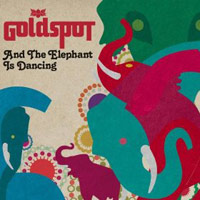
And the Elephant Is Dancing
self-released
Hailed as one of the best pop bands to come out of America in 2007 by various periodicals and radio stations, Goldspot seemed poised to make waves in the music industry with the release of their first full-length, Tally of the Yes Men. Yet, it’s likely you’ve never heard of them. This is not to say you haven’t at least heard them—their music has been featured in everything from eBay ads to various television shows and films. This time around, they’re back to try for repeat success by way of And the Elephant Is Dancing, albeit perhaps with a bit more notoriety. If their previous effort was, to be blunt, a rather cliched alterna-pop offering, then this record is certainly a baby step in the right direction.
Elephant is essentially 11 songs of lighthearted guitar strumming, simplistic vocal harmonies, and the occasional string breakdown. The album progresses leaps and bounds above the previous effort, most notably in terms of sound quality and arranging. However, it probably won’t pull Goldspot out of the TV soundtrack–niche. The music comes off sounding as though they write songs specifically for episodes of 90210, with the subject matter becoming slightly inane at times, as almost every song deals with the melodrama of love and heartache. (That is no exaggeration—almost every song on the album contains the word “love” or “heart” in at least three utterances.) Still, the sweeping harmonies and overall sound quality are solid enough to forgive any lyrical shortcomings.
These guys have quite a diverse background, and it’s nice to see them utilize it, especially with the native nod, “Gopi Blues,” which encompasses a beautiful symphonic introduction that cedes to all-out buoyant guitar-driven pop. In fact, that lighthearted quality pervades the whole album. “The Moon Is Too Far” is a simple Beatles-esque ditty with another lovely string interlude, and “Call Center Girl” is a nice break from the deluge of strumming, adding some much needed rhythm. The bursts of sound are hopeful and idealistic, as is much of the rest of the album. Sometimes, it’s nice to swim around in a fantasy world for an hour or so, and occasionally, words can’t really describe the delight of a feel-good pop album to break through a bitterly cold winter day.
Jennifer Farmer

All Killer: Finders Keepers Records 1–20
Finders Keepers
To celebrate their 20th release, groove and psychedelia archeologists Finders Keepers enlisted the Gaslamp Killer to mix bits and pieces from all 20 records in their catalog into this album, the latest entry in their B-Music series. With the label specializing in unearthing gems that span the globe and the decades, it’s no surprise that this release is an idiosyncratic, multi-culti hodgepodge of sounds, only held together by Mr. Killer’s expert hand and a certain funky vibe.
With 12 tracks to the album, this means that two to three sources were used for every cut. As such, Gaslamp juxtaposes a bunch of disparate sources, like “Hadd Mondjam El” from ’70s Hungarian psych-rock goddess Sarolta Zalatnay with music from a French choreography album and tracks from Turkish artists Selda and Zafer Dilek. Or proto-electronica artist Bruno Spoerri with a song from the soundtrack to Czech New Wave film Daisies. All the remixes are untitled (just the mashed sources are given for each), but this expert rearranging is almost compositional in its seamless segueing. Like that of much of the Finders Keepers’ work, this record’s sources prove that there’s no telling where a good groove can be found.
Stephen Slaybaugh
ALBUM REVIEWS
Dragon Turtle, Almanac
Deer Tick, More Fuel for the Fire EP
Kitsuné Maison's Compilation 8
Julianna Barwick, Florine EP
Easter Monkeys, Splendor of Sorrow
Wizzard Sleeve, Make the World Go Away
We All Have Hooks for Hands, The Shape of Energy
The Mercury Program, Chez Viking
The Mary Onettes, Islands
Daptone Gold
Morrissey, Swords
World's Greatest Ghosts, No Magic
Jacuzzi Boys, No Seasons
Pants Yell! Received Pronunciation
